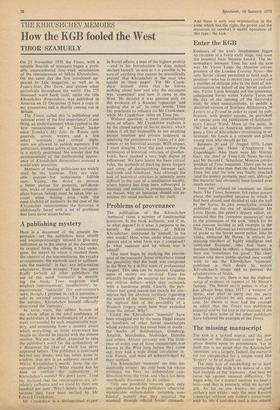Enter the KGB
Rumours of the KGB's involvement began to circulate at a fairly early stage, and soon the essential facts became known. The in- termediary between Time Inc and the KGB was Mr Victor Louis the Moscow corres- pondent of the London Evening News—the only Soviet citizen permitted to hold such a position—who has in recent years carried out a number of delicate jobs in the field of mis- information on behalf of the Soviet authori- ties. Victor Louis brought out the somewhat unbalanced Soviet writer Valeriy Tarsis on the day of the opening of the Sinyaysky trial; he tried unsuccessfully, to peddle a doctored version of Svetlana Alliluyeva's 20 Letters to a Friend in order to upset its pub- lication; with greater success, he provoked an uproar over the publication of Solzhenit- syn's Cancer Ward. More to the point, in 1967 he sold an American television com- pany a film of Khrushchev reminiscing in re- tirement. Mr Louis is a versatile and gifted young man who should go far. Between 20 and 27 August 1970, Louis stayed at the Hotel d'Angleterre in Copenhagen. Also there were Mr Murray Gart, the chief of Time-Life News Service, and Mr Jerrold L. Schechter, Moscow corres- pondent of Time magazine. There can be no doubt that it was then that the deal between Time Inc and the KGB was finally clinched (and the money probably paid out), although the material had obviously been handed over much earlier.
Time Inc refused to comment on these facts. The Times, however, felt rather queasy about the undignified position in which it had been placed, and decided to take the bull by the horns. In „two remarkable articles published on the eve of serialisation Mr Louis Heren, the paper's deputy editor, an- nounced that the 'complete manuscript' was in the possession of the KGB, 'which for its own reasons decided to sell excerpts in the West'. Then followed an extraordinary paean of praise to the Soviet secret police. Into its ranks, enthused Mr Heren, 'it attracts in- creasing numbers of highly intelligent and cultivated Russians', who find there a freedom denied to others, a freedom which they use 'sometimes for good'. The chief reason why these public-spirited men would wish to see the Khrushchev 'memoirs' published is their desire to restore Khrushchev's image and to prevent the rehabilitation of Stalin.
Needless to say, there is not the slightest scrap of evidence in support of Mr Heren's fantasy. The Soviet secret police, is what it has always been since 1917: a weapon of terror, ever alert to carry out the party leadership's policies by any means, at any cost. Mr Heren at least had the courage to admit that the Times was publishing material sold by the KGB in the interests of the KGB. To date none of the other publishers have followed the example of the Times.










































 Previous page
Previous page